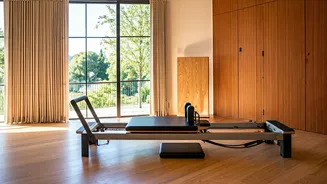Core Power Unveiled
One of the standout benefits of Pilates lies in its focus on core strength, something that gym workouts and walking may not fully emphasize. Pilates exercises
are designed to engage and strengthen the deep core muscles, crucial for stability and posture. By consistently practicing Pilates, individuals can build a strong foundation that supports the spine, improves balance, and enhances overall body control. This is a significant advantage over walking, which, while beneficial for cardiovascular health, doesn't offer the same level of targeted core engagement. Gym routines, while often including core work, may not prioritize the precision and control inherent in Pilates. The method’s emphasis on controlled movements ensures a more mindful and effective approach to strengthening these essential muscles.
Flexibility and Mobility
Pilates is particularly effective at boosting flexibility and mobility, another key advantage it holds over the gym and walking. The exercises in Pilates incorporate a range of movements designed to lengthen and stretch muscles, which enhances range of motion and overall flexibility. This can be compared to the gym, where routines may sometimes prioritize strength gains over flexibility. Similarly, walking, though beneficial for general health, does not provide the specific stretching and movements that Pilates offers. With enhanced flexibility, the body becomes more resilient to injuries, and daily activities become easier and more comfortable. Pilates offers a more holistic approach in promoting greater ease of movement and enhancing physical performance.
Mind-Body Connection
Pilates also provides a powerful mind-body connection that differs from standard gym workouts or walking routines. Pilates requires a high degree of concentration and focus on the breath and controlled movements. This mindful approach helps reduce stress and promotes a sense of calm and well-being. Unlike gym workouts, which can sometimes be focused on repetitive movements or lifting heavy weights, Pilates emphasizes precision and awareness. Walking can also be a mindful activity, but Pilates adds a specific layer of concentration. The method helps to promote improved body awareness and stress reduction, making it a valuable practice for overall mental health.
Injury Prevention Advocate
Pilates is exceptional for injury prevention, surpassing the benefits often provided by a gym workout or walking. The focus on core strength, flexibility, and proper alignment in Pilates enhances the body's ability to absorb shock and support the joints, which reduces the risk of injuries. Many Pilates exercises are low-impact, making them a safe option for individuals of all fitness levels. While both gym workouts and walking can contribute to fitness, they may not always prioritize injury prevention as meticulously as Pilates does. The controlled movements and emphasis on proper technique help develop a more robust body, capable of withstanding the stresses of daily life and physical activity. Pilates contributes to the longevity and safety of the body, encouraging a sustainable fitness routine.
Home Pilates Routine
Finally, Pilates can be easily integrated into a home routine, something that distinguishes it from gym workouts, which require access to a dedicated facility. Many Pilates exercises can be performed with minimal equipment, such as a mat and resistance bands, making it accessible and convenient for people with busy schedules. Walking, too, is simple to incorporate into daily life, but Pilates offers a more structured approach to exercise that can be done at home. There are a wealth of online resources, including videos and tutorials, that guide individuals through various Pilates routines. This accessibility allows individuals to maintain a consistent exercise regimen, regardless of their location or time constraints.



















